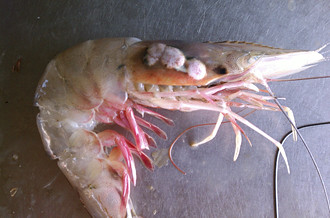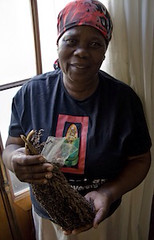All waters in the Mississippi Sound and Mobile Bay, and some areas of Bon Secour, Wolf Bay and Little Lagoon were closed to shrimpers. Reports of grossly deformed seafood all along the Gulf from Louisiana to the Florida panhandle have been logged with increasing urgency, but Alabama is the first state to actually close waters to the seafood industry.“We’re continuing to pull up oil in our nets. People who live here know better than to swim in or eat what comes out of our waters.”
And it’s not just the shrimp. Commercial fishermen are reporting red snapper and grouper riddled with deep lesions and covered with strange black streaks. Highly underdeveloped blue crabs are being pulled up in traps without eyes and claws…Commercial fishers Tracy Kuhns and Mike Roberts from Barataria, LA reported to Al Jazeera when showing samples of eyeless shrimp…
“At the height of the last white shrimp season, in September, one of our friends caught 400 pounds of these. Disturbingly, not only do the shrimp lack eyes, they even lack eye sockets.”And there’s no question that the leftover mess from BP’s disaster can affect human health. The dispersants BP used to ‘hide’ the extent of their blow-out contain solvents that are notoriously toxic to people and include known mutagens. Pathways of human exposure include inhalation, skin and eye contact as well as ingestion, and exposure causes headaches, vomiting, diarrhea, abdominal pain, chest pain, respiratory system damage, skin sensitization, hypertension, CNS depression, neurotoxic effects, cardiac arrhythmia and cardiovascular damage. They also cause fetal deformities and cancer. More





